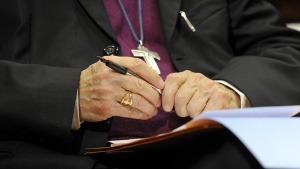The current crisis of Catholicism comes much less from secularization than from the renewals initiated by the rediscovery of the Bible and the advent of spirituality. For the essayist Jean Duchesne, it will take time to measure the effects.
This time of Pentecost invites us to wonder what the Holy Spirit is currently up to. Because the situation does not seem very bright: Sunday practice has fallen further since the health crisis; the Church is rocked by cases, including sexual abuse; historians and sociologists note that France is no longer a Christian nation, etc. As if theupdating of Vatican II had remained in vain. However, we can see things differently: not from the outside, as a distant observer, nor from the inside, witnessing a necessarily limited experience, but by trying to take a little height from which the depths are revealed. , while it is difficult to measure them if you are immersed in them or if you stay on the edge.
Church resilience in destabilized societies
No one will dispute that, for a good century, Catholicism has formally changed. What counts is not the visible and quantifiable: the abandonment of Latin, cassocks and nuns’ cornettes, the fall in the number of messalizers, baptisms, priestly and religious vocations, weddings and funerals in the church… Because all this is only effects and consequences. It is usually said to be the result of technical-economic-socio-cultural revolutions, growing prosperity, the rise of individualism, secularization…
But on this account, the Church is not the only one to have been affected. Society as a whole has radically evolved and broken down. The major political parties (Communist, Socialist, Gaullist, etc.) are dying. Institutions like the PTT, EDF-GDF, the ORTF, the SNCF, the school system and the regions have either disappeared, or lost their monopoly, or been divided, restructured — and it’s not over. In the midst of these upheavals, the Church proves to be of rare resilience. Even today, there are probably more people at Mass each week than around sports grounds or in movie theatres.
Secularization does not explain everything
It remains to explain this endurance. A chilly and obtuse old-fashionedness is not enough. Because there was in the XXe century two major renewals, specific to Catholicism. The “human sciences” are ill-equipped to detect them. And, internally, we hardly become aware of it, since it is a matter of acquired knowledge that very few believers question, because it is not at all a question of novelty. We can say that these are qualitative reappropriations, the repercussions of which will still take some time to become quantitative.
The first of these revivals is the rediscovery by Catholics of the Bible, including the Old (or better: First) Testament. The Scriptures had been more or less abandoned to the Protestants, because they had found in them pretexts for heresies and schisms, so much so that the faithful were discouraged from putting their noses there: dangerous! The modernist crisis has paradoxically prompted us to take Tradition in its entirety seriously. Around 1900, the creation of the Biblical School of Jerusalem by the Dominicans, then the founding of the Pontifical Biblical Institute, entrusted to the Jesuits, enabled the publication, from 1950, of the Bibles of Maredsous, Jerusalem, Osty, Pierre de Beaumont, Chouraqui, etc. And these translations, both modern and scientific, were best sellers.
Bible and spirituality: the two rediscoveries of the 20th century
This revival of the Bible had considerable repercussions. First in the liturgy: we realized that the living and life-giving Word of God is a constitutive part of it. Then in theology, rethought on the basis of this self-revelation of God, and no longer of philosophical proofs of his existence, as the neo-Thomist system taught against doctrinal atheism: cut off from the Jewish milieu of Jesus and the apostles, the Gospel is incomprehensible. Another extension of this return to the First Testament was the “reunion” with immarcescible Judaism, since “God is faithful to his promises” (Rom 11, 1-2).

But this “biblicization” accompanied another regeneration: the invention of spirituality. In the 19th century, we still did not talk about it. There was on the one hand, for everyone, asceticism — that is, not only mortifications, but exercises (askeseis in Greek) of piety; and on the other, for the extremely rare privileged few, mysticism — in other words, the intimate experience of the mystery of God. However, the “experienced” has taken on more and more importance, starting from the introspection launched by romanticism and favored by the improvement of living conditions, the development of free time and information, which leads to a general feeling of inner autonomy (even if conformism is very far from having disappeared).
From conformism to personal choice
We have thus moved from a “sociological” religion to a personalized religiosity, chosen and no longer inherited. Church membership has only become more selective. We walk away from it if anything displeases it. The tension between asceticism and mysticism is then overcome: the observance of formal discipline is no longer the obligatory means of perhaps achieving communion in the beyond, but is linked to states of mind, which motivate piety as much as it nourishes them. Nothing new: Christ himself did not hide his feelings, neither Saint Paul nor Saint Augustine… There is a rebalancing here, progress through renewal, as well as in the biblical refocusing of the liturgy and the faith, which draw on the origins of Tradition, while taking on the whole of history — including that of secular culture.
These are actualizations with non-quantitatively measurable effects. The renewal crystallized on the occasion of Vatican II. The council did not invent or decree anything ex nihilo. He combined the achievements of the return to the Scriptures and the experiences of Christian life in the 20th century. As was foreseeable, those for whom the Church had had its time and could not really change were not conquered, neither those for whom it had to change anything above all, nor those for whom it had to change even more. , breaking with its at least recent past.
Popular Catholicism of Pope Francis
Those who benefit from the renewals of recent decades are therefore few. The reappropriation of the biblical and Jewish heritage can take several generations. The re-articulation imposed by the advent of spirituality between norms and subjectivity, dogma and charity, fidelity and adaptation, etc. requires patient work. This is why Catholicism in the West becomes a minority and sometimes even seems divided. So much progress cannot all be assimilated en masse at once, but the process is underway. The Church is “in crisis” primarily because of its internal progress, and not because of secularization.
In this context, it is to a real need that the efforts of Pope Francis respond to find a popular religion, with simple messages, aimed at putting the faith within everyone’s reach. This is what he did, for example, in his homily for the canonization of Charles de Foucauld on May 15, 2022. Holiness, he said, is not “the reward for personal heroism”, but to “embrace in everyday life, in the dust of the street, in the efforts of concrete life and, as Saint Teresa of Avila said, “among the pots in the kitchen””. It would be presumptuous to exclude that this encouragement was inspired by the Holy Spirit who has already brought about the resources on which we still have to connect ourselves better.


